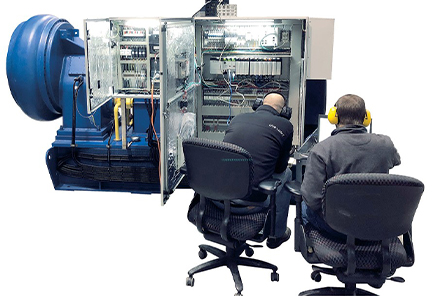Control panels have always played a crucial role in industrial automation and process control systems. They provide the necessary interface for operators to monitor and control various equipment and processes. Traditionally, control panels were designed with physical switches, buttons, and indicators. However, with the advent of technology, human-machine interface (HMI) panels have revolutionized the control panel manufacturing industry.
HMI panels, also known as operator panels or touch panels, have completely transformed the way operators interact with control systems. These panels incorporate advanced graphical user interfaces (GUI) that enable operators to control and monitor processes more efficiently and intuitively.
One of the key advantages of HMI panels is their ability to display real-time data in a visual format. Instead of relying on physical indicators or numerical displays, operators can now see data in the form of graphs, charts, and animations. This visual representation allows for quicker and more accurate decision-making, as operators can easily identify trends, patterns, and anomalies.
Furthermore, HMI panels offer a high degree of customization. Operators can configure the display layout according to their preferences and specific requirements. They can choose the data to be displayed, the size and position of the elements, and the color schemes. This flexibility ensures that operators have access to the information they need in the most convenient and meaningful way.
The integration of touch technology in HMI panels has also simplified control panel operation. Operators can interact with the panels by simply touching the screen, eliminating the need for physical buttons and switches. This not only saves space but also reduces the chances of mechanical failure. Additionally, touch gestures such as swipe, pinch, and zoom make it easier to navigate through menus and perform various operations.
Another significant advantage of HMI panels is their remote accessibility. With the help of network connectivity, operators can access the control panel interface from anywhere within the plant or even from remote locations. This feature allows for convenient monitoring and control, enabling operators to respond quickly to any issues or emergencies. It also facilitates remote troubleshooting and maintenance, reducing downtime and increasing productivity.
Moreover, HMI panels enable seamless integration with other automation systems and software applications. They can communicate with programmable logic controllers (PLCs), distributed control systems (DCS), supervisory control and data acquisition (SCADA) systems, and other devices through different protocols. This interoperability enhances the overall efficiency and effectiveness of the control system, as data can be shared and processed in real-time across different platforms.
In terms of product development, HMI panels have also introduced significant advancements. Manufacturers can now design and create control panels more efficiently using specialized software tools. These tools allow for rapid prototyping, simulation, and testing, reducing the time and cost required for manufacturing. Additionally, modular design principles enable easy customization and scalability, accommodating different application requirements and future expansions.
With the increasing adoption of Industry 4.0 and the Internet of Things (IoT), the role of HMI panels is becoming even more critical. HMI panels can facilitate the integration of control systems with data analytics, machine learning, and artificial intelligence technologies. This integration opens up new possibilities for predictive maintenance, optimization, and advanced decision support systems.
In conclusion, human-machine interface panels have revolutionized the control panel manufacturing industry. They offer enhanced visualization, customization, touch technology, remote accessibility, integration capabilities, and product development efficiencies. As industrial automation continues to evolve, HMI panels will play a pivotal role in ensuring efficient and intuitive control and monitoring of processes.
